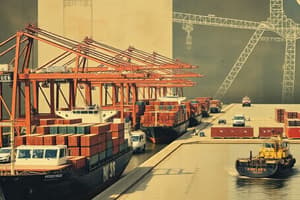Podcast
Questions and Answers
What is a key component of port operations that involves loading and unloading cargo from vessels?
What is a key component of port operations that involves loading and unloading cargo from vessels?
- Logistics Coordination
- Customs and Security
- Storage Facilities
- Cargo Handling (correct)
Which type of cargo is characterized by being packed in containers for efficient transport?
Which type of cargo is characterized by being packed in containers for efficient transport?
- Liquid cargo
- Containerized cargo (correct)
- Break-bulk cargo
- Bulk cargo
What role is primarily responsible for scheduling and assigning berths for vessels in port operations?
What role is primarily responsible for scheduling and assigning berths for vessels in port operations?
- Stevedores
- Port Authority (correct)
- Terminal Operators
- Logistics Coordinators
Which challenge in port operations is often caused by high traffic volumes?
Which challenge in port operations is often caused by high traffic volumes?
What trend in port operations focuses on improving efficiency through the use of technology?
What trend in port operations focuses on improving efficiency through the use of technology?
Flashcards are hidden until you start studying
Study Notes
Overview of Port Operations
- Refers to the management and coordination of activities at seaports.
- Key to facilitating international trade and shipping logistics.
Key Components of Port Operations
-
Cargo Handling
- Loading and unloading cargo from vessels.
- Use of specialized equipment (cranes, forklifts).
-
Storage Facilities
- Warehouses for temporary storage of goods.
- Containers and bulk storage systems.
-
Berthing
- Scheduling and assigning berths for vessels.
- Consideration of tide, weather, and vessel sizes.
-
Customs and Security
- Compliance with local and international regulations.
- Inspection of cargo and documentation to prevent smuggling.
-
Logistics Coordination
- Integration with road and rail transport.
- Efficient movement of goods to/from the port.
-
Maintenance and Upgrades
- Regular maintenance of equipment and infrastructure.
- Investment in new technologies and facilities.
Types of Cargo
- Containerized cargo: Goods packed in containers for efficient transport.
- Bulk cargo: Unpacked goods (liquid or solid) transported in large quantities.
- Break-bulk cargo: Individual units or items that are loaded separately.
Key Roles in Port Operations
- Port Authority: Governing body managing port activities and policies.
- Terminal Operators: Manage specific terminal operations within the port.
- Stevedores: Workers responsible for loading and unloading cargo.
Challenges in Port Operations
- Congestion and delays due to high traffic volumes.
- Environmental concerns and compliance with regulations.
- Technological advancements and the need for digitalization.
Trends in Port Operations
- Automation of cargo handling and operations.
- Adoption of green practices and sustainability initiatives.
- Enhanced digital supply chain management for efficiency.
Overview of Port Operations
- Port operations involve the management of all activities that take place in seaports.
- They are crucial for international trade and shipping logistics.
Key Components of Port Operations
- Cargo Handling: Involves loading and unloading goods from ships using specialized equipment such as cranes and forklifts.
- Storage Facilities: Provide temporary storage for goods in warehouses, containers, and bulk storage systems.
- Berthing: The process of scheduling and assigning berths for ships, considering factors like tide, weather, and vessel size.
- Customs and Security: Ensures compliance with regulations, including inspections of cargo and documentation to prevent smuggling.
- Logistics Coordination: Connects port operations with road and rail transport, enabling efficient movement of goods to and from the port.
- Maintenance and Upgrades: Includes regular maintenance of equipment and infrastructure, as well as investments in new technologies and facilities.
Types of Cargo
- Containerized Cargo: Goods packed in standard-sized containers for efficient transport.
- Bulk Cargo: Unpacked goods, either liquid or solid, transported in large quantities.
- Break-Bulk Cargo: Individual units or items loaded separately.
Key Roles in Port Operations
- Port Authority: The governing body responsible for managing port activities and policies.
- Terminal Operators: Manage the operations of specific terminals within the port.
- Stevedores: Workers who specialize in loading and unloading cargo.
Challenges in Port Operations
- Congestion and Delays: High traffic volumes can lead to congestion and delays in port operations.
- Environmental Concerns: Ports face environmental considerations and need to comply with regulations.
- Technological Advancements: Keeping up with technological advancements and digitalization is also a challenge.
Trends in Port Operations
- Automation: Automation of cargo handling and operations is becoming increasingly common.
- Green Practices: Adoption of green practices and sustainability initiatives is a growing trend in port operations.
- Digital Supply Chain Management: Enhanced digital supply chain management is used to improve efficiency in the port.
Studying That Suits You
Use AI to generate personalized quizzes and flashcards to suit your learning preferences.




